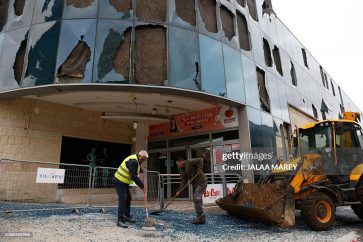The United Nations General Assembly adopted a resolution titled “Oil slick on Lebanese shores” urging the Zionist entity to pay Lebanon some $850 mn compensation to cover the clean-up cost of an oil spill caused by the Zionist July 2006 war on the country.
The UNGA voted 166 in favor of the non-binding resolution to 8 against (Australia, Canada, the Zionist entity, Marshall Islands, Federated States of Micronesia, Nauru, Palau, United States), with 7 abstentions (Cameroon, Democratic Republic of Congo, Honduras, Papua New Guinea, South Sudan, Tonga, Vanuatu).
Taking into account the 1992 Rio Declaration on Environment and Development, which in principle requires the polluter to pay environmental damage costs, the assembly found the Zionist entity guilty of the July 15, 2006 environmental disaster.
The disaster was caused by a Zionist strike on the oil storage tanks in the direct vicinity of the Jiyeh electric power plant in Lebanon. As a result an oil slick covered the Lebanese coastline entirely, stretching all the way to the Syrian coastline.
By that text, the Assembly considered that the oil slick had heavily polluted the shores of Lebanon with 15,000 tons of oil and partially polluted Syrian shores and consequently had serious implications for the Lebanese economy.
The Assembly decision followed the assessment report by Secretary-General Ban Ki-moon which stipulated the value of damage to be $856.4 million. Now the Assembly is asking the Zionist entity to provide “prompt and adequate compensation.”
The oil slick made by the spill “has had serious implications for livelihoods and the economy of Lebanon,” the resolution read, accounting for inflation of a October 2007 estimate by the United Nations Secretary General that reported the spill caused $729 million in damage.
Lebanon bore the brunt of the spill, but the Syrian coast and other Mediterranean countries suffered as well, the UN said, asking Lebanon to continue clean-up efforts and the international community to increase funding for its environmental restoration.
The resolution noted that the UN chief expressed “grave concern at the lack of any acknowledgment on the part of the government of Israel of its responsibilities vis-a-vis reparations and compensation” to Lebanon and Syria for the oil spill.
Lebanon’s permanent representative to the UN Nawaf Salam hailed the resolution and called it a “major progress.”
“We affirm that Lebanon will continue to mobilize all resources and resort to all legal means to see that this resolution is fully implemented, and that the specified compensation is paid promptly,” he said.
“This resolution also paves the way for further compensation into other areas of damage (health, ecosystem services as habitat, potential groundwater contamination, and marine diversity), that were not considered in the current calculated amount,” Salam added.
For its part, the Zionist mission to the UN rejected the resolution, expressing wonders how it does not cover the environmental damage occurred in northern occupied territories following the attack on Lebanon, claiming that the entity launched the July 2006 war on the country was “a consequence.”
The Zionist entity waged a brutal 33-day war on Lebanon in July 2006, killing hundreds of Lebanese people and leaving serious damages in vital infrastructure. The war ended by a UN 1701 resolution which urged the enemy’s entity to halt hostilities and withdraw till behind the blue line drawn by the UN forces after the liberation of most occupied Lebanese southern territories in May 2006.
Source: United Nations General Assembly




